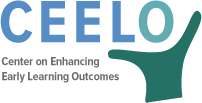The Center on Enhancing Early Learning Outcomes (CEELO) is proud to partner with New America on this blog series highlighting early learning opportunities and challenges under the Every Student Succeeds Act (ESSA). In this week’s post, Danielle Ewen explains how ESSA establishes new opportunities for building and supporting birth-to-third-grade systems at both state and local levels.
Across the country, states are adopting a number of different strategies to improve outcomes for students: third grade reading requirements, literacy initiatives, new assessment and accountability systems, plus an increased focus on data-driven decision-making are changing how districts approach teaching and learning for all students. These initiatives are stronger when they are part of a birth-to-third grade early education (B-3rd) continuum for children and families.
Already a growing number of states and communities are investing in high-quality early learning settings, as well as home visiting programs; improving transitions between early childhood and early elementary programs, aligning standards and assessments across ages and grades, and designing professional learning systems that include early childhood professionals, directors, teachers, and school and district leaders.
The federal Every Student Succeeds Act (ESSA) establishes new opportunities for building and supporting birth-to-third-grade systems at both state and local levels, enabling states to integrate B-3rd strategies into their new focus on equity, accountability, assessment, professional learning and school improvement.
ESSA does not require investments in early learning, but rather encourages states and districts to use the flexibility inherent across all the Titles of the law to create evidence-based interventions that will best meet the needs of their students, families, teachers and schools. To be most successful in creating and implementing a birth to third grade continuum, states will need to be intentional at every step of ESSA implementation, from the development of the state plans, through the design of district plan applications and fiscal and programmatic monitoring, to guidance and technical assistance, to foster effective birth to third grade approaches.
In this first phase of plan development, a number of states have proposed policy changes that will support birth to third grade alignment across early childhood programs and providers and elementary schools to help improve the quality of services for children and families. To set the stage, a number of states have explicitly named kindergarten readiness as a specific long-term goal. For example, Connecticut’s strategic plan for education notes that the state department of education will “work with partners to ensure every child enters kindergarten ready to learn.”
Other state strategies include:
Accountability: a number of states are reporting early childhood information in their accountability systems, either as part of their School Quality and Student Success Indicator or on state and local report cards. Arizona has linked early childhood data sources to the state longitudinal data system in order to help families make more informed decisions. Illinois will create a K-2 indicator to align teaching and learning goals across the grades. Similarly, Tennessee has created portfolio assessments in pre-K and kindergarten that will include measures of growth and guide teaching and professional learning.
Effective transitions: recognizing the need to ensure seamless transitions between and across early childhood programs and elementary schools, states are encouraging districts to develop new processes to share information about curriculum, professional learning, children’s development and availability of high quality early learning settings. Michigan will use the school improvement process to require LEAs to address a range of transition supports in their plans, including how child records will be transferred, and coordinating comprehensive developmental screening services. North Carolina is working to create a planning document that will guide the development of local transition plans. Existing pre-kindergarten committees will be asked to lead the transition planning process with district agencies.
Aligned professional development: Recognizing the need to create shared expectations and understanding of child development and school readiness, states are using their professional learning systems as a core component of birth to third grade system building in a variety of ways. Michigan has proposed creating an aligned professional development system to help educators and administrators better understand children’s learning and development from birth to age 8. Nevada has created an early childhood leadership series designed to help elementary school leaders and early childhood providers support appropriate practice in classrooms with young children. Delaware is targeting the literacy needs of students with disabilities in grades K-3 with an initiative providing coaching, targeted professional learning and technical assistance, and support to identify the root causes of student skill gaps.
Every state can include a birth to third grade approach in their implementation of ESSA. Whether and how those policies become reality for young children and their families will require leadership and an intentional and intensive effort by state and district agencies and educators. Early childhood administrators can lead the way.
For further information on ESSA see CEELO’s ESSA webpage and New America’s Early and Elementary Education Team’s ESSA webpage.
Danielle Ewen is a Senior Policy Adviser at EducationCounsel. She has served in numerous leadership positions in child care and early education policy. She previously served as the Director of the Office of Early Childhood Education in the District of Columbia Public Schools, where she oversaw the operations of programs serving three- and four-year old children in high quality, comprehensive classrooms. Prior to her work in DCPS, Ms. Ewen served as the Director of the Child Care and Early Education team at the Center for Law and Social Policy (CLASP).

